Gary Neal Hansen's Blog, page 35
February 7, 2018
Registration Week for My Online Prayer Class for Lent!
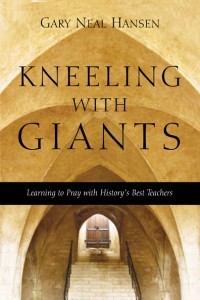
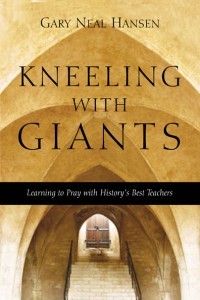 Kneeling with Giants on Amazon (affiliate link)
Kneeling with Giants on Amazon (affiliate link)Lent is only one week away! (At least for those of us in the West. Schedules are a tad different for the Orthodox.)
And for me one of the great things about Lent is teaching my online prayer class, “Focus on Prayer.”
Lent is all about bringing our hearts to God to be ready for the great events of Good Friday and Easter. Deepening and renewing your prayer life is a great way to help that happen.
When I was developing the class I asked some of the people who expressed interest what their #1 struggle was when it came to prayer. The great majority said the same thing:
FOCUS.”
Some struggled to KEEP focused when they tried to pray.
Some struggled to find enough focus in their busy lives to even TRY to pray.
Focus on Prayer
So I developed this course, using three of the classic approaches to prayer that I wrote about in my book, Kneeling with Giants: Learning to Pray with History’s Best Teachers (InterVarsity Press, 2012)
One classic Protestant approach
One classic Catholic approach
One classic Orthodox approach
Each one chosen because it aids focus, and each will be practiced in ways that will help bring prayer back into the focus it really needs.
An Online Prayer Class for Lent
So… The class officially starts on Ash Wednesday, February 14.
Each week you’ll have a video lecture, a manageable but helpful amount of reading, and 15 minutes or so of prayer practice. Plus the class has discussion forums for people to encourage each other and learn from each other.
Registration is open through that Ash Wednesday — and then it closes for another year.
The people who have been in the class have said great things about it. For at least one it was, in her words, a “game changer.” I’d love for you to have the same experience.
The post Registration Week for My Online Prayer Class for Lent! appeared first on Gary Neal Hansen.
February 1, 2018
Letters to a Young Pastor: “Give Us This Day Our Daily Bread”

 Dear ______:
Dear ______:
Just a short note today, as I’m under the weather. I’ll spare you the interruptions for hacking and wheezing.
As I was saying, the “modifiers” in the various lines of the uber-familiar Lord’s Prayer make all the difference to its meaning.
Noticing these little in-betwen bits is especially helpful if you are going to go beyond the rote recitation of the prayer Christ taught his disciples. (And you should — Luther has a ton to say about it, as you may know from my book Kneeling with Giants: Learning to Pray with History’s Best Teachers.)
Last time I was pondering the line “Thy will be done, on earth as it is in heaven.”
Let me say a word or two about “Give us this day our daily bread.”
The core of this line is a personal request:
Give us bread!”
I’ve always found in this a clear word to all the over-humble souls who boast that they will pray for others but would never ask anything for themselves. Since Jesus actually commands us to pray for our own bread, not doing so is clearly a mistake.
But there is more in the modifiers.
Give us this day our daily bread
We pray for “daily” bread.
We pray for bread for “this day.”
Note the contrast to any greedy pseudo-Christian prayer that aims at wealth. We are not, with apologies to Marie-Antoinette who, it seems, never actually said “Let them eat cake,” praying for fancy food, or rich food.
We aren’t called to pray for a full pantry, fridge, and chest freezer, to be the fully-equipped home chef.
Nor are we praying for vast bins of dry-goods and bottled water stocked up for the apocalypse.
Jesus’ invitation, his instruction, is much simpler:
We pray to be nourished. We pray for enough food to live and be healthy.
And we pray for it one-day-at-a-time.
Every day we are reminded by Jesus that every blessing, even food, comes from his generous and loving hand.
We may think first that our food comes from money we earn, spent at a shiny supermarket. Praying the Lord’s Prayer reminds us that our job is a gift, the food is grown by the hard labor of farmers, and it comes to us through further labor of many others who bring it to the shelves and run the store.
We are all dependent on God for each day’s bread. And God’s way of bringing it to us shows how dependent we are on each other.
It is all about gratitude, my friend, and living moment by moment trusting our good and generous God rather than ourselves.
Blessings,
Gary
————
Prayer classes upcoming…
I’m contemplating offering a “Pray Like a Reformer” online class for later this year. If you are interested in hearing about it, click here to get on the waiting list for my prayer courses. That’s the way to be sure you get info by email.
————
And on the topic of prayer courses, Lent is coming very soon. I’m aiming to offer my “Focus on Prayer” class for the third Lent in a row. It is a really fun way to help make Lent a time of spiritual renewal, exploring three classic approaches to Christian prayer.
We’ll be using three chapters of my book Kneeling with Giants, one Protestant, one Catholic, and one Orthodox. If you want me to email you when registration opens, click the button and get on the waiting list.
————
This post contains an affiliate link to Amazon. That means if you click though to buy my book there, I’ll get a wee small commission.
The post Letters to a Young Pastor: “Give Us This Day Our Daily Bread” appeared first on Gary Neal Hansen.
January 25, 2018
Letters to a Young Pastor: “On Earth As It Is In Heaven”

 cc by NASA/Goddard/Arizona State University 2.0
cc by NASA/Goddard/Arizona State University 2.0Dear ______:
Thanks, I’m glad to be back in touch as well. I’m glad you enjoyed my comments on the first line of the Lord’s Prayer, “Our Father in heaven…” And yes, I’ll happily explain my cryptic comment about the “modifiers” being the really interesting thing about several lines of the Lord’s Prayer.
Some of the lines are straightforward. Look at the first two requests:
Hallowed be thy name.”
Thy kingdom come.”
Once you get past the archaic words, these are very clear and to the point.
No so much the next line. we pray,
Thy will be done…”
and it seems quite plain — though even here there are a number of ways to take it.
Martin Luther asked that God should be sure to do God’s own will, and absolutely not do Luther’s will, since he was a sinful man and would ask for the wrong thing.
On the other hand, I personally take this line as permission to pray confidently for all the things I see Jesus doing in the gospels, since those things are clearly his will (You know, the way he provided health care to everyone who needed it, fed everyone who was hungry, comforted the grieving, welcomed foreigners, etc.)
But simply praying that God’s will be done is not the end of the request. Grammatically it is modified by the phrase
…on earth as it is in heaven.”
Well that prompts a bit more thinking, doesn’t it? How is God’s will done in heaven?
Scripture gives us only a few clues, but I think we can make some inferences.
On Earth As It Is In Heaven
In heaven God’s will is done without objection. When Isaiah was given the vision of God enthroned, he heard God’s will in a call to go. His response?
Here I am, Lord. Send me.”
In heaven God’s will is done quickly. That’s pretty much the opposite of what happens down here, wouldn’t you say? I think of the dozens and dozens of seminarians I’ve heard tell their stories of being called by God. The stereotype most relate is that God was calling for years and years, and finally for one reason or another they got worn down and gave in.
It is hard to picture that kind of resistance and procrastination among the angels.
So we pray that our response would be willing, ready to serve in love.
In heaven God’s will is done by all. We pray God’s will be done, not only by us as individuals, but as churches — and if you’ve ever walked a few miles with a congregation as it tries to do God’s will you know that responding “quickly and without objection” may seem like uncharted territory.
In heaven God’s will is done in a spirit of joyful worship. The glimpses of heaven we have in the book of Revelation, show us saints and creatures surrounding the throne, spending all their energy on singing the praise of God. Whatever else they are up to, it is filled with the echoes of the same
Holy, Holy, Holy is the Lord God of Hosts!”
that
Isaiah heard in his vision.
Now isn’t that something worth praying for? Wouldn’t that look like a transformed life? If the Holy Spirit really did shake us up and renew us in the image of Christ, we might just find ourselves doing God’s will with easy quick joyful obedience — just as it is in heaven.
Praying for you,
Gary
————
Lenten Prayer Class
While we are on the topic of prayer, Lent is coming very soon. I’m aiming to offer my “Focus on Prayer” class for the third Lent in a row. It is a really fun way to help make Lent a time of spiritual renewal, exploring three classic approaches to Christian prayer.
We’ll be using three chapters of my book Kneeling with Giants, one Protestant, one Catholic, and one Orthodox. If you want me to email you when registration opens, click the button and get on the waiting list.
The post Letters to a Young Pastor: “On Earth As It Is In Heaven” appeared first on Gary Neal Hansen.
January 22, 2018
Podcast Interview — “Shift the Story” with Beca Lewis

 I’m on another podcast! This one came about in a fun way: I was waiting in the registration line at a writing conference and thye woman next to me happened to have come in on the same flight. Then the next day we were randomly sorted into the same car for a lunch outing. Then she invited me to be on her show.
I’m on another podcast! This one came about in a fun way: I was waiting in the registration line at a writing conference and thye woman next to me happened to have come in on the same flight. Then the next day we were randomly sorted into the same car for a lunch outing. Then she invited me to be on her show.
Beca Lewis is a charming and creative soul who is deeply committed to the spiritual journey, to writing, and to the spiritual journey OF writing. Her podcast looks at “the way, why, and importance of shifting not only our personal stories, but our stories about the world.”
This is a much shorter listen, coming in at around 20 minutes.
Shift the Story Podcast, with Beca Lewis
Here’s the link to listen on Beca’s site.
Here’s the link to the podcast on iTunes (I’m in episode 110).
Here’s the link to the podcast on Stitcher (I’m in episode 110)
We did the interview back in December when I was in the middle of teaching my Advent class on lectio divina. We talk about that in the interview, and it is of interest to you please click the button below to be on the list so I can notify you when it opens up again next November.
And if you can’t wait till November for an online class on classic and life-changing approaches prayer, very soon I will open up registration for my Lenten class called “Focus on Prayer.” That same button below will let me notify you by email when registration opens up.
The post Podcast Interview — “Shift the Story” with Beca Lewis appeared first on Gary Neal Hansen.
January 18, 2018
Letters to a Young Pastor: “Our Father Who Art in Heaven”

 CC by Gugatchitchinadze-SA 4.0
CC by Gugatchitchinadze-SA 4.0Dear ______:
I’m so sorry for not writing for so long! Thanks for your notes. It has been a complicated time, and I’m behind in my correspondence.
You bring up a very interesting issue.
Some of my friends in seminary say we shouldn’t pray the Lord’s Prayer, at least not in the way we always have, because it uses gender-exclusive language. What do you say?”
Well I say several things.
Our Father Who Art In Heaven
First, your friends are not actually charting new territory. The same issue was troubling many back when I was in seminary. And you can find ancient theologians dealing with the issue of gendered language for the Persons of the Trinity as long ago as the fourth century.
(See Gregory of Nazianzus’ “Theological Orations” where he acknowledges that the terms “Father” and “Son” bear with them the gendered meanings we know fundamentally from human relationships. He points out that the gendered implication is imprecise when it comes to the Godhead. He suggests that there is more precision in “Begetter” and “Begotten” but that the biblical words serve us better. They are certainly better at expressing personal and relational qualities. But I digress.)
Second, you need to start with listening deeply to your friends and the issues that give rise to the objection. Some, perhaps most, who struggle with this do so because of deeply wounding relationships with their own fathers. People’s wounds are not to be trifled with. Those who bear them may struggle with the church and its language of prayer all their lives — and that is really rotten for them. Be with them in their struggles.
Third, though, when it comes to the Lord’s Prayer, note with care the words that surround the term “Father.”
Our
Before “Father” comes the crucial modifier “Our.” When Jesus told his followers that they could pray this, he was inviting them into his own relationship with God.
He was the only-begotten of God, the first and sole person who could claim God as his one-and-only father according to Matthew and Luke.
It is the same as when the risen Christ said he would ascend to “my father and your father, to my God and your God” (John 20:17, NIV). The relation that was his by nature became ours by adoption. This phrase expresses the gift that as Christians we become the children of God.
Who Art in Heaven
After “Father” comes the other crucial modifier, “in heaven.” This expresses the sense that the God who has adopted us is truly the living God, creator of heaven and earth. It tells us of God’s transcendence.
Though God has brought us into an intimate relation, that of a parent and a child, God is beyond our reach, beyond our control — and apart from the revelation in Christ, beyond even our knowing.
Theology is not experience writ large
All this to say, Jesus framed the word “Father” with two important terms. Both show that we are not dealing with the broken and wounded man, the guilty and sinful man who provided half our genetic material. We are not intended to look at the guy who abandoned us, or abused us, or even who loved us and raised us well, and project him onto God.
Avoiding that projection is hard spiritual and theological work. It is, however, the work we are all called to do. The opening phrase of the Lord’s prayer uses a gendered word, but it is not about God’s gender. It is about the relations between the Persons of the Trinity and the change salvation brings in our own relation to God.
And as with other parts of the Lord’s Prayer, looking at the modifiers brings us to the richness of its meaning.
Write soon. Be well.
Blessings,
Gary
————
Lenten Prayer Class
While we are on the topic of prayer, Lent is coming very soon. I’m aiming to offer my “Focus on Prayer” class for the third Lent in a row. It is a really fun way to help make Lent a time of spiritual renewal, exploring three classic approaches to Christian prayer.
We’ll be using three chapters of my book Kneeling with Giants, one Protestant, one Catholic, and one Orthodox. If you want me to email you when registration opens, click the button and get on the waiting list.
The post Letters to a Young Pastor: “Our Father Who Art in Heaven” appeared first on Gary Neal Hansen.
January 16, 2018
Presbyterian Outlook Article — Pray Like A Reformer

 The good folks at The Presbyterian Outlook asked me to write a feature article for an issue devoted to prayer. You can read it here.
The good folks at The Presbyterian Outlook asked me to write a feature article for an issue devoted to prayer. You can read it here.
This is how it starts:
Pray Like a Reformer
The anniversary is over – now down to business.
Welcome to 2018 – the year after the 500th anniversary of the Reformation. If you and your church took the anniversary seriously, it was a time to examine our roots, to think again about why our faith is shaped the way it is and to consider why our churches seek to live it out the particular way we do.
If the tone of celebration seemed triumphant… [click here to read the rest.]
I’d love to hear your thoughts on this piece! You can leave comments on the Outlook site, and I’ll probably see them eventually, or you can leave a comment here and I’ll catch it right away.
I’m contemplating offering a “Pray Like a Reformer” online class for later this year. If you are interested in hearing about it, click here to get on the waiting list for my prayer courses. That’s the way to be sure you get info by email.
————
And on the topic of prayer courses, Lent is coming very soon. I’m aiming to offer my “Focus on Prayer” class for the third Lent in a row. It is a really fun way to help make Lent a time of spiritual renewal, exploring three classic approaches to Christian prayer.
We’ll be using three chapters of my book Kneeling with Giants, one Protestant, one Catholic, and one Orthodox. If you want me to email you when registration opens, click the button and get on the waiting list.
The post Presbyterian Outlook Article — Pray Like A Reformer appeared first on Gary Neal Hansen.
January 2, 2018
I’m on “The Prolific Christian Writer” Podcast!

 Southern California pastor, writer, and podcaster Thien Doan invited me to be on his podcast! This was my first podcast invitation, so I was really jazzed about it. (I didn’t spill the beans by telling Thien that I’m not really so prolific.)
Southern California pastor, writer, and podcaster Thien Doan invited me to be on his podcast! This was my first podcast invitation, so I was really jazzed about it. (I didn’t spill the beans by telling Thien that I’m not really so prolific.)
The Prolific Christian Writer Podcast
It is a pretty new podcast and I hope you will give it a listen, especially if you are aiming to publish a book at some point. Thien has been interviewing a variety of writers, both traditionally published and those finding success in the indie publishing movement. He also gives good windows into his own growing work in writing and publishing. There are good takeaways in every episode.
Thien and I talk about a bunch of stuff, including
The background and aftermath of my book Kneeling with Giants
Pros and cons of both traditional and indie publishing
The editing process of a traditionally-published book
Wining an award, reader feedback, and other cool stuff that a book can bring
Anyway, this is just a quick post to let you know that if you want to hear me talk about the writing life you can check it out. Turns out this includes the same rapid-fire but hopefully-fun-filled delivery some readers remember from the seminary classroom. It went live yesterday afternoon.
This link takes you right to the episode on ThienDoan.net.
Here’s a link to the podcast on iTunes. (I’m in episode 11.)
Here it is on Stitcher (I’m in episode 11.)
Enjoy! And let me know what you think in the comments below.
The post I’m on “The Prolific Christian Writer” Podcast! appeared first on Gary Neal Hansen.
January 1, 2018
Saint Basil of Caesarea — Theology in Worship
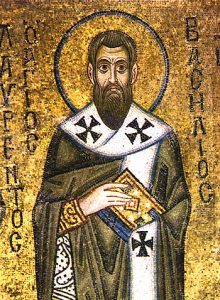
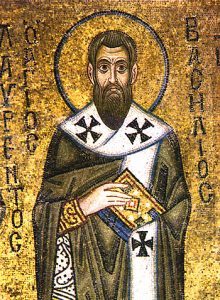 Happy New Year!
Happy New Year!In the Church’s calendar the year kicks off with the commemoration of one of my favorite saints: Basil of Caesarea (c. 329-379).
He was a fourth century archbishop in Asia Minor, one of the “Three Great Cappadocians” who were influential in the development of core Christian doctrine. He is often pictured as one of the “Three Hierarchs” who are deeply revered in Orthodoxy, along with Gregory of Nazianzus and John Chrysosotom.
It may seem odd if you are starting the year celebrating a theologian you have never heard of, but the other option for today is “The Circumcision of the Lord.” (See Luke 2:21. Happy eighth day of Christmas!)
Anyway, I suspect you will rejoice that I’m sticking to Basil.
Basil of Caesarea
Basil was an amazing guy. He became the defining figure for the Orthodox bishop, concerned with keeping the Church’s teaching pure, keeping its worship a beautiful and consistent expression of its theology, and taking good care of those in need.
Theology, worship, and justice. What more do we want from the church’s leaders?
(If you want to know more about St. Basil as a bishop and have a few bucks to spend, see Andrea Sterk’s book Renouncing the World Yet Leading the Church: Then Monk-Bishop in Late Antiquity.)
There are many topics one could highlight about St. Basil, but I want to mention his role in one controversy: the Holy Spirit.
What, you may wonder, is the controversy about the Holy Spirit? Isn’t the Bible perfectly clear about the Holy Spirit?
Well, yes and no. The Bible mentions the Holy Spirit many times but, as on most topics, the clarity we think we see took centuries to emerge.
Here is a little running start:
Everybody knew from the start that there is just one God.
When the New Testament talked about “the Father” they knew it meant that one God.
But the New Testament also talked about “Jesus” who is “the Son.”
In the early fourth century a guy named Arius argued that “the Son” is actually created by the Father, so Jesus is less than God.
The Council of Nicaea in 325 said the Son is eternally God, “of one substance” with the Father.
On the Holy Spirit
Once it was officially settled that both the Father and the Son are equal Persons of the one eternal God, some raised the question of the Holy Spirit. Surely, they argued, the Holy Spirit is one step down the ladder — holy, okay, but not God.
They called the people who said this the “Pneumatomachi.” It means“fighters against the Spirit.” I think it is one of the more pleasurable theological words to roll off your tongue.
Enter St. Basil of Caesarea. Basil wrote the first full-length book on the Holy Spirit. He gave it a clever title: On the Holy Spirit. (You can read it yourself in this nice edition from St. Vladimir’s Seminary Press.)
Anyway, Basil looked through the biblical material about the Holy Spirit and argued that the Spirit is just as much the eternal God as the Father and the Son. There is one God, and that God is eternally three Persons, Father, Son, and Holy Spirit. All the arguments that had been used a generation before to say the Son is God came in very handy.
But then Basil brought a new kind of argument into the game. He said we should look at the Church’s worship. The way we pray to God and the way we sing about God expresses what we actually believe about God.
He pointed out that from time immemorial Christians everywhere in every liturgy praise the Holy Spirit in terms exactly equal to our praise of the Father and the Son.
Theology in Worship
It is an interesting sort of argument.
It worked because in that era there was such consistency in the way Christians worshipped, wherever Christianity had reached. You get a hint of this if you worship in an Orthodox church, where the liturgy is the same, with the same cycle of prayers and hymns woven in throughout the year, all around the world. The language and style of music may vary, but the actual words of worship will be the same.
And Basil was clearly right about the Spirit. Any Orthodox worship service will convince you that the Spirit is praised as God. Those prayers and hymns go back many centuries.
You can make an argument about Orthodox theology today by listening to Orthodox worship.
It works differently in the Protestant world, though Basil’s point is worthy of serious reflection.
You can’t make an argument about Protestant theology in general from listening to the prayers and hymns of any particular church. Protestantism is far too fragmented for that. Frankly there is little one can say is universal teaching in 21st-century Protestantism. The prayers and hymns of any given congregation will tell you only about the particular slice of the Protestant pie that the congregation is part of.
A Little Experiment
But you can still make good use of Basil’s point as a Protestant. Take a good hard listen to the prayers that are prayed in your congregation. Take a good hard look at the hymns and songs that are sung over the course of a month or a year. In the way you worship you will find what your congregation actually believes — or what your pastor is hoping you will believe.
Take what you learn from those prayers and hymns and write out what they proclaim in a list of bullet points. It may be surprisingly short. It may be surprisingly long. See how much theological content you can articulate from your worship.
Then compare your list of bullet points to some classic summary of your denomination’s theology — a Creed, or a Confession, or a Catechism. Or read through the Bible and highlight all the bits that are found in your bullet points. Then give a longer harder look at the parts of your confessions and your Bible that your worship seems to leave out.
What if you find a gap between the theology of your worship and the theology of your confessions and your Bible? Well then, I’d say you have your work cut out for you.
Before we go…
I’ve had a couple requests for an online non-credit course in the Christian understanding of the Trinity. If you might be interested, click the button below and send me your email so I can get a sense of the interest in theologically-oriented classes!
Let me know about theology classes!
This post contains affiliate links
The post Saint Basil of Caesarea — Theology in Worship appeared first on Gary Neal Hansen.
November 23, 2017
Thanksgiving for the Big Picture

 This is just a quick note on Thanksgiving Day.
This is just a quick note on Thanksgiving Day.
That’s American Thanksgiving in my family, since we have celebrated Canadian Thanksgiving last month. (Same menu, same gratitude, no Pilgrims.)
I am, of course, grateful to you. I’m glad you read what I write here on my blog and elsewhere. What is a writer without readers? Thanks, especially, for every time you post a comment or send an email in response.
And I’m extra specially thankful that you are reading this after my blog has been on hiatus for so many months.
This Thanksgiving arrives in a season for my country and our world where it is so easy to be more concerned than joyful. I won’t go into a litany of the problems. I won’t ignore them either, but the point of the post is thanksgiving in the midst of them.
Ancient Israel faced many a dark time too.
They were enslaved in Egypt for 400 years.
When God finally set them free, they wandered for decades, homeless in the wilderness.
Once they were led to the land that had been promised, they faced war from neighboring countries and division of their own country.
Eventually they were overthrown and large numbers were taken into exile.
They knew all about problems with their government, and they knew what it was like to be refugees.
But they gave thanks.
Thanksgiving for the Big Picture
My case in point is one of my favorite psalms, number 136. (I wrote about it a couple years ago.)
Take a look:
The beginning verse set the pattern: There is a call to give thanks, followed by a declaration that “God’s steadfast love endures forever!”
In the rest of the psalm the first half of every verse recites Israel’s history in order: creation, slavery in Egypt, deliverance, wilderness, land of promise…
And the second half of every verse makes the declaration of a thankful heart: “God’s steadfast love endures forever!”
The good stuff? That’s fodder for giving thanks.
The hard stuff? That’s fodder for giving thanks too.
Why? Because the writer of the psalm had the big picture in mind. The big picture of the history of the world is the expression of God’s steadfast, generous, overflowing love.
Sometimes — a lot of times for a lot of people — things are very very hard. But our story is part of God’s story, and it all works out well in the end.
If it isn’t working out well, then you know this isn’t the end.
Underneath and through your story and mine, underneath and through the story of the Church and the world, God’s steadfast love endures forever.
Give it a try at your Thanksgiving feast:
Each person can provide their own first half of a new verse for Psalm 136 — something they are grateful for.
Then all the rest can say the second half:
“God’s steadfast love endures forever!”
Happy thanksgiving to you and yours!
Gary
The post Thanksgiving for the Big Picture appeared first on Gary Neal Hansen.
November 20, 2017
Enrollment Is Open for My Lectio Divina Class!
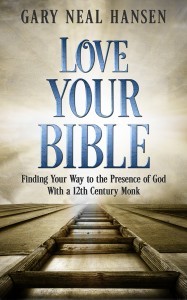
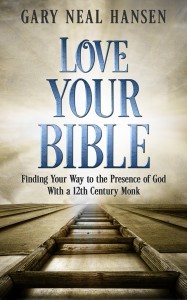 Hello friends!
Hello friends!
I haven’t posted on my blog for a long while due to publication deadlines and other obstacles. But at several speaking engagements I promised to run my online course on classical lectio divina again this Advent.
The classic form of this ancient spiritual discipline is far richer (and a far better starting point) than the various modern versions of lectio divina.
Lectio Divina is a prayerful way of engaging with Scripture
It is more prayerful than typical Bible study.
It engages the Bible more richly than typical prayer.
Think of it as a way to meet God where God has been waiting to meet you all along.
The course has options for both individuals and study groups, so if you would like to lead an adult-ed course or small group on lectio divina, here’s an easy way to make it happen.
A Lectio Divina class for Advent?
Advent is a time designed for spiritual renewal as we prepare to celebrate the coming of Jesus Christ in the world at Christmas. Exploring a classic Christian prayerful approach to the Bible may be just the thing to get you in the real spirit of Christmas.
Click here to get the full low-down on the course.
I hope you will join us! I think you will find it fun, informative, and a time of real growth in faith.
If you like a button better, here’s another route to the info page:Learn about the Lectio Divina class!
The post Enrollment Is Open for My Lectio Divina Class! appeared first on Gary Neal Hansen.



